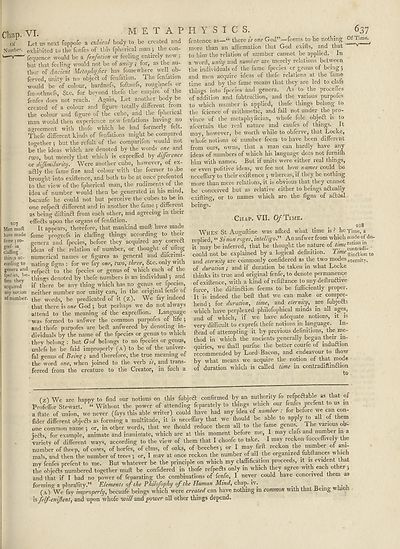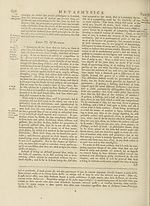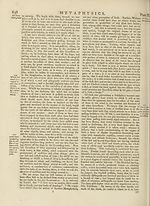Encyclopaedia Britannica, or, a Dictionary of arts, sciences, and miscellaneous literature : enlarged and improved. Illustrated with nearly six hundred engravings > Volume 13, MAT-MIC
(683) Page 637
Download files
Complete book:
Individual page:
Thumbnail gallery: Grid view | List view

Chap. VI. M E T A P
Of Let us next fuppofe a cubical body to be created and
Number, exhibited to the fenfes of this fpherical man j the con-
L— fequence would be a fenfation or feeling entirely new :
but that feeling would not be of unity ; for, as the au¬
thor of Ancient Metaphjfics has fomewhere well ob-
ferved, unity is no objeid of feniation. i he xenfation
would be of colour, hardnefs, foftnefs, roughnefs or
fraoothnefs, &c. for beyond thefe the empire ot the
fenfes does not reach. 'Again, Let another body be
created of a colour and figure totally different from
the colour and figure of the cube, and the fpherical
man would then experience new fenfations having no
agreement with thofe which he had formerly felt.
Thefe different kinds of fenfations might be compared
together \ but the refult of the comparifon would not
be the ideas which are denoted by the words one and
two, but merely that which is expreffed by difference
or dijjimilarity. Were another cube, however, of ex-
a£tly the fame fize and colour with the former to >be
brought into exiftence, and both to be at once prefented
to the view of the fpherical man, the rudiments of ilie
idea of number would then be generated in his mind,
becaufe he could not but perceive the cubes to be in
one refpeft different and in another the fame \ different
as being diftinft from each other, and agreeing in tneiv
20- effedls upon the organs of fenfation.
Men muft It appears, therefore, that mankind muff have made
have made fome progrefs in clafling things according to their
genera and fpecies, before they acquired any con c£!
ideas of the relation of number, or thought of ufing
numerical names or figures as general and dhcrimi-
nating figns : for we fay one, /wo, three, &c. only with
1 anc^ refpedt to the fpecies or genus of which each of the
fore the'^ things denoted by thefe numbers is an individual j and
acquired^ if there be any thing which has no genus, or fpecies,.
any notion neither number nor unity can, in the original lenfe of
of number, ^g. worcL, be predicated of it (z). We fay indeed
that there is one God j but perhaps we do not always
attend to the meaning of the expreffion. Language
was formed to anfwer the common purpofes of life j
and thofe purpofes are beft anfwered by denoting in¬
dividuals by the name of the fpecies or genus to which
they belong : but God belongs to no fpecies or genus,
unlefs he be faid improperly (a) to be of the univer-
fal genus of Beinsr ; and therefore, the true meaning 01
the word one, when joined to the verb is, and trans¬
ferred from the creature to the Creator, in fuch a
H Y S I C S.
637
fome 1 re¬
gret- in
clafling
thin ;s ac¬
cording to
genera and
fentence as—-“ there is one God”—feems to be nothing Of Time,
more than an affirmation that God exifts, and that “ v—”
to him the relation of number cannot be applied. In
a word, unity and number are merely relations between
the individuals of the fame fpecies or genus of being ;
and men acquire ideas of thefe relations at the fame
time and by the fame means that they are led to clafs
things into fpecies and genera. As to the proceffes
of addition and fubtraclion, and the various purpofes
to which number is applied, thefe things belong to
the feience of arithmetic, and fall not under, the.pro¬
vince of the metaphyfician, whofe foie object is to
afeertain the real nature and caufes of things. It
may, however, be worth while to obferve, that Locke,
whofe notions of number feem to have been differe nt
from ours, owns, that a man can hardly have any
ideas of numbers of which his language does not furnifh
him with names. But if units were either real things,
or even potitive ideas, we fee not how names could be
neceffary to their exiftence *, whereas, if they be nothing
more than mere relations, it is obvious that they cannot
be conceived but as relative either to beings adually
exiftmg, or to names wInch are the figns of afliial
beings.
Chap. VII. 0/Time.
20S
When St Auguftine was alked what time is ? he Time, a
replied, “ Si non roges, intelligo.^ Ananfwer from which mode of du-
it may be inferred, that he thought the nature •
could not be explained by a logical definition. Time ftinaion t0
and eternity are commonly confidered as the two modes eternity.
of duration ; and if duration be taken in what Locke
thinks its true and original fenfe, to denote permanence
of exiftence, with a kind of refiftance to any deitru&ive
force, the diftin&ion feems to be fufficiently proper.
It is indeed the beft that tve can make or compre¬
hend 5 for duration, time, and eternity, are fubjects
which have perplexed philofophical minds in all ages,
and of which, if we have adequate notions, it is
very difficult to exprefs thefe notions in language. In-
ftead of attempting it by previous definitions, the me¬
thod in which the ancients generally began their in¬
quiries, we (hall purfue the better courfe of indu&ion
recommended by Lord Bacon, and endeavour to (how
by what means we acquire the notion of that, mode
of duration which is called time in contradiftm£lion
to
OO We are happy to find our notions on this fubjeft confirmed by. an authority fo refipeftable as that of
Profeffor Stewart. “ Without the power of attending feparately to things which our fenfes prefent to us m
a (late of union, we never (fays this able writer) could have had any idea of : for before we can con-
fider different objefts as forming a multitude, it is neceffary that we (hould be able to apply to all . m
one common name •, or, in other words, that we (hould reduce them all to the fame genus ^e various ob-
ieas, for example, animate and inanimate, which are at this moment before me, I may clafs and nu b ln
variety of different ways, according to the view of them that I choofe to take. 1 ™ay reckon fucceffively the
number of (beep, of cows, of horfes, of elms, of oaks, of beeches j or I may firft reckon the number o ani¬
mals, and then the number of trees *, or, I may at once reckon the number of all the organized fubftances w 1
my fenfes prefent to me. But whatever be the principle on which my claflification proceeds, it .is eviden a^
the obiefls numbered together muft be confidered in thofe refpeffs only in which they agree with each other j
and that if I had no power of feparating the combinations of fenfe, I never could have conceived them as
forming a plurality.” Elements of the Philofophy of the Human Mind, chap. iv. . i • t.
(a) We fay improperly, becaufe beings which were created can have nothing in common with that Being wine 1
is felf-exijlent, and upon whofe will and power all other things depend.
Of Let us next fuppofe a cubical body to be created and
Number, exhibited to the fenfes of this fpherical man j the con-
L— fequence would be a fenfation or feeling entirely new :
but that feeling would not be of unity ; for, as the au¬
thor of Ancient Metaphjfics has fomewhere well ob-
ferved, unity is no objeid of feniation. i he xenfation
would be of colour, hardnefs, foftnefs, roughnefs or
fraoothnefs, &c. for beyond thefe the empire ot the
fenfes does not reach. 'Again, Let another body be
created of a colour and figure totally different from
the colour and figure of the cube, and the fpherical
man would then experience new fenfations having no
agreement with thofe which he had formerly felt.
Thefe different kinds of fenfations might be compared
together \ but the refult of the comparifon would not
be the ideas which are denoted by the words one and
two, but merely that which is expreffed by difference
or dijjimilarity. Were another cube, however, of ex-
a£tly the fame fize and colour with the former to >be
brought into exiftence, and both to be at once prefented
to the view of the fpherical man, the rudiments of ilie
idea of number would then be generated in his mind,
becaufe he could not but perceive the cubes to be in
one refpeft different and in another the fame \ different
as being diftinft from each other, and agreeing in tneiv
20- effedls upon the organs of fenfation.
Men muft It appears, therefore, that mankind muff have made
have made fome progrefs in clafling things according to their
genera and fpecies, before they acquired any con c£!
ideas of the relation of number, or thought of ufing
numerical names or figures as general and dhcrimi-
nating figns : for we fay one, /wo, three, &c. only with
1 anc^ refpedt to the fpecies or genus of which each of the
fore the'^ things denoted by thefe numbers is an individual j and
acquired^ if there be any thing which has no genus, or fpecies,.
any notion neither number nor unity can, in the original lenfe of
of number, ^g. worcL, be predicated of it (z). We fay indeed
that there is one God j but perhaps we do not always
attend to the meaning of the expreffion. Language
was formed to anfwer the common purpofes of life j
and thofe purpofes are beft anfwered by denoting in¬
dividuals by the name of the fpecies or genus to which
they belong : but God belongs to no fpecies or genus,
unlefs he be faid improperly (a) to be of the univer-
fal genus of Beinsr ; and therefore, the true meaning 01
the word one, when joined to the verb is, and trans¬
ferred from the creature to the Creator, in fuch a
H Y S I C S.
637
fome 1 re¬
gret- in
clafling
thin ;s ac¬
cording to
genera and
fentence as—-“ there is one God”—feems to be nothing Of Time,
more than an affirmation that God exifts, and that “ v—”
to him the relation of number cannot be applied. In
a word, unity and number are merely relations between
the individuals of the fame fpecies or genus of being ;
and men acquire ideas of thefe relations at the fame
time and by the fame means that they are led to clafs
things into fpecies and genera. As to the proceffes
of addition and fubtraclion, and the various purpofes
to which number is applied, thefe things belong to
the feience of arithmetic, and fall not under, the.pro¬
vince of the metaphyfician, whofe foie object is to
afeertain the real nature and caufes of things. It
may, however, be worth while to obferve, that Locke,
whofe notions of number feem to have been differe nt
from ours, owns, that a man can hardly have any
ideas of numbers of which his language does not furnifh
him with names. But if units were either real things,
or even potitive ideas, we fee not how names could be
neceffary to their exiftence *, whereas, if they be nothing
more than mere relations, it is obvious that they cannot
be conceived but as relative either to beings adually
exiftmg, or to names wInch are the figns of afliial
beings.
Chap. VII. 0/Time.
20S
When St Auguftine was alked what time is ? he Time, a
replied, “ Si non roges, intelligo.^ Ananfwer from which mode of du-
it may be inferred, that he thought the nature •
could not be explained by a logical definition. Time ftinaion t0
and eternity are commonly confidered as the two modes eternity.
of duration ; and if duration be taken in what Locke
thinks its true and original fenfe, to denote permanence
of exiftence, with a kind of refiftance to any deitru&ive
force, the diftin&ion feems to be fufficiently proper.
It is indeed the beft that tve can make or compre¬
hend 5 for duration, time, and eternity, are fubjects
which have perplexed philofophical minds in all ages,
and of which, if we have adequate notions, it is
very difficult to exprefs thefe notions in language. In-
ftead of attempting it by previous definitions, the me¬
thod in which the ancients generally began their in¬
quiries, we (hall purfue the better courfe of indu&ion
recommended by Lord Bacon, and endeavour to (how
by what means we acquire the notion of that, mode
of duration which is called time in contradiftm£lion
to
OO We are happy to find our notions on this fubjeft confirmed by. an authority fo refipeftable as that of
Profeffor Stewart. “ Without the power of attending feparately to things which our fenfes prefent to us m
a (late of union, we never (fays this able writer) could have had any idea of : for before we can con-
fider different objefts as forming a multitude, it is neceffary that we (hould be able to apply to all . m
one common name •, or, in other words, that we (hould reduce them all to the fame genus ^e various ob-
ieas, for example, animate and inanimate, which are at this moment before me, I may clafs and nu b ln
variety of different ways, according to the view of them that I choofe to take. 1 ™ay reckon fucceffively the
number of (beep, of cows, of horfes, of elms, of oaks, of beeches j or I may firft reckon the number o ani¬
mals, and then the number of trees *, or, I may at once reckon the number of all the organized fubftances w 1
my fenfes prefent to me. But whatever be the principle on which my claflification proceeds, it .is eviden a^
the obiefls numbered together muft be confidered in thofe refpeffs only in which they agree with each other j
and that if I had no power of feparating the combinations of fenfe, I never could have conceived them as
forming a plurality.” Elements of the Philofophy of the Human Mind, chap. iv. . i • t.
(a) We fay improperly, becaufe beings which were created can have nothing in common with that Being wine 1
is felf-exijlent, and upon whofe will and power all other things depend.
Set display mode to:
![]() Universal Viewer |
Universal Viewer | ![]() Mirador |
Large image | Transcription
Mirador |
Large image | Transcription
Images and transcriptions on this page, including medium image downloads, may be used under the Creative Commons Attribution 4.0 International Licence unless otherwise stated. ![]()
| Permanent URL | https://digital.nls.uk/192692926 |
|---|
| Attribution and copyright: |
|
|---|
| Description | Ten editions of 'Encyclopaedia Britannica', issued from 1768-1903, in 231 volumes. Originally issued in 100 weekly parts (3 volumes) between 1768 and 1771 by publishers: Colin Macfarquhar and Andrew Bell (Edinburgh); editor: William Smellie: engraver: Andrew Bell. Expanded editions in the 19th century featured more volumes and contributions from leading experts in their fields. Managed and published in Edinburgh up to the 9th edition (25 volumes, from 1875-1889); the 10th edition (1902-1903) re-issued the 9th edition, with 11 supplementary volumes. |
|---|---|
| Additional NLS resources: |
|

